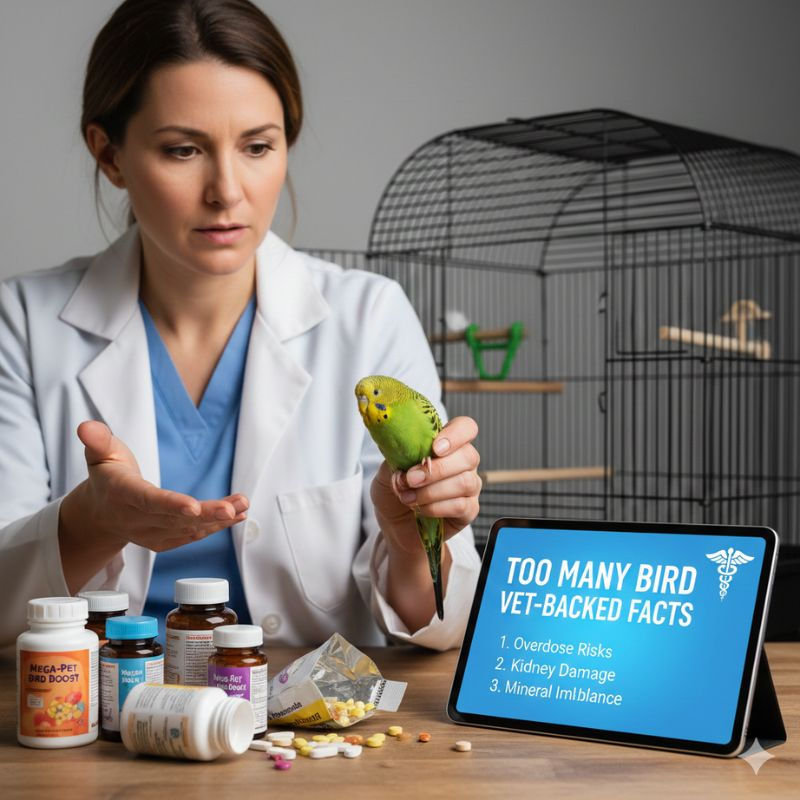Is Your Bird's Diet Missing Something? Discover What They Really Need to Eat
- petperchlove
- Apr 8, 2025
- 4 min read

Feeding birds may seem simple at first glance, but providing the right nutrition is essential to ensuring their health, longevity, and happiness. Whether you have a parakeet, a cockatiel, a canary, or you're feeding wild birds in your backyard, their dietary needs are more complex than just offering seeds. This guide explores what do birds eat, the differences between Pet Bird Food and Wild Bird Food, and how to ensure your feathered friends get a balanced, nutritious diet.
Understanding What Birds Really Need in Their Diet
Birds require a balanced diet that supports their energy levels, feather condition, immune system, and overall wellbeing. Depending on the species, birds may need a mix of seeds, fruits, vegetables, insects, and even specialized pellets.
Key Nutritional Components in a Bird's Diet:
Proteins – Critical for muscle development and feather health. Found in legumes, insects, and some pellets.
Carbohydrates – Provide birds with energy. Sourced from grains and some fruits.
Fats – Needed in moderation, especially for birds that live in colder environments or are highly active.
Vitamins and Minerals – Essential for bone health, egg production, and immune function.
Water – Often overlooked, but clean water is vital daily.
What Do Birds Eat in the Wild vs. In Captivity?
The question of what do pet birds eat doesn't have a one-size-fits-all answer. Birds in the wild have a broader foraging range, whereas pet birds rely entirely on their owners.
Wild Birds
Wild Bird Food typically includes:
Seeds from grasses and plants
Berries and fruits
Insects and worms
Nectar (especially for hummingbirds)
Nuts
Feeding wild birds involves offering a mix of these in feeders, especially during migration seasons or in colder months when natural food is scarce.
Pet Birds
Pet Bird Food must be tailored to the species. Parrots, budgies, and finches have unique dietary preferences and requirements. Commercial Bird Food blends often contain seeds, pellets, dried fruits, and nuts. However, relying solely on seeds can lead to nutritional deficiencies.
Common Mistakes in Feeding Birds
1. Seed-Only Diets
While seeds are a favorite for many birds, they’re often high in fat and low in essential nutrients. Over time, this can lead to obesity, liver disease, and vitamin deficiencies.
2. Lack of Fresh Foods
Incorporating chopped vegetables (like carrots, kale, broccoli) and fruits (like apple slices, bananas, or berries) can dramatically improve a bird's diet.
3. Ignoring Species-Specific Needs
Different birds have different dietary requirements. For example, lorikeets thrive on nectar, while finches prefer small seeds and greens.
How to Choose the Right Bird Food
When selecting Bird Food, whether for your pet or the wild birds in your garden, look for products with high-quality ingredients and no artificial additives. For Pet Bird Food, choose a brand that includes a variety of grains, fruits, vegetables, and fortified pellets to ensure balanced nutrition.
Consider these tips:
Rotate between seed mixes and pellets.
Supplement with fresh produce.
Avoid offering harmful foods like chocolate, avocado, or caffeine.
Consult an avian vet for specific dietary guidance.
Supplements: Are They Necessary?
In many cases, if you're providing a well-balanced diet, supplements may not be required. However, birds recovering from illness, laying eggs, or undergoing molting may benefit from additional calcium or vitamin D. Always consult with a vet before adding supplements to your bird’s routine.
Seasonal Considerations
Birds’ dietary needs can change with the seasons. Wild Bird Food for winter months should be rich in fat and protein to help birds maintain body heat. In summer, hydration and lighter fare are more important. Pet Bird Food doesn't need to change drastically with seasons, but increasing hydration and fresh produce during hot months can be beneficial.
Final Thoughts
Providing the right food is one of the most impactful ways you can support your bird’s health and happiness. Whether you're feeding a cherished pet or nurturing local wildlife, understanding what do birds eat is crucial. Use high-quality Pet Bird Food, offer fresh fruits and vegetables, and pay attention to the specific needs of each species.
FAQs
Q1. What do birds eat besides seeds?
Birds also enjoy fruits, vegetables, insects, nuts, and specialized pellets. A diet consisting only of seeds can lead to nutritional imbalances.
Q2. Can I feed wild birds the same food as pet birds?
Not always. Wild Bird Food is designed for the natural foraging behaviors and nutritional needs of wild species, whereas Pet Bird Food is tailored to captive birds' lifestyles.
Q3. How often should I feed my pet bird?
Most pet birds should be fed once or twice a day, with constant access to fresh water. Treats like fruits or vegetables can be offered daily in small portions.
Q4. What foods are harmful to birds?
Avoid chocolate, avocado, onions, garlic, alcohol, and caffeinated beverages. These can be toxic to both wild and pet birds.
Q5. Do birds need supplements?
Supplements may be necessary during specific life stages like breeding, molting, or recovery from illness. Always seek veterinary advice before adding supplements to their diet.



Comments